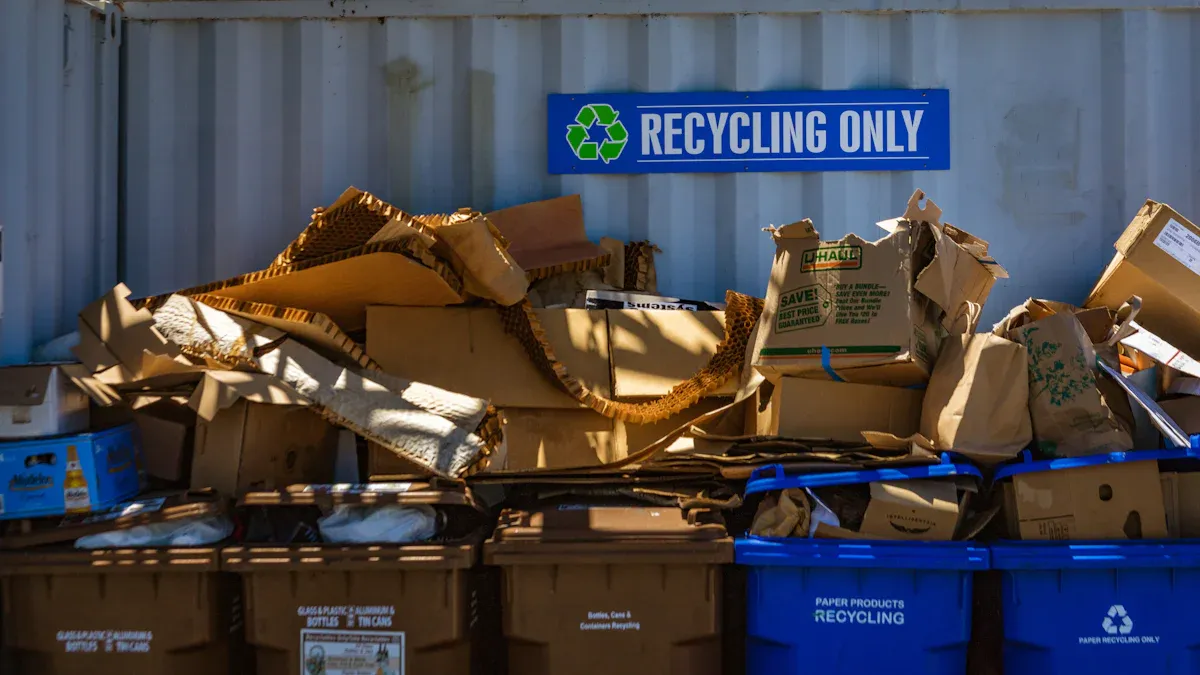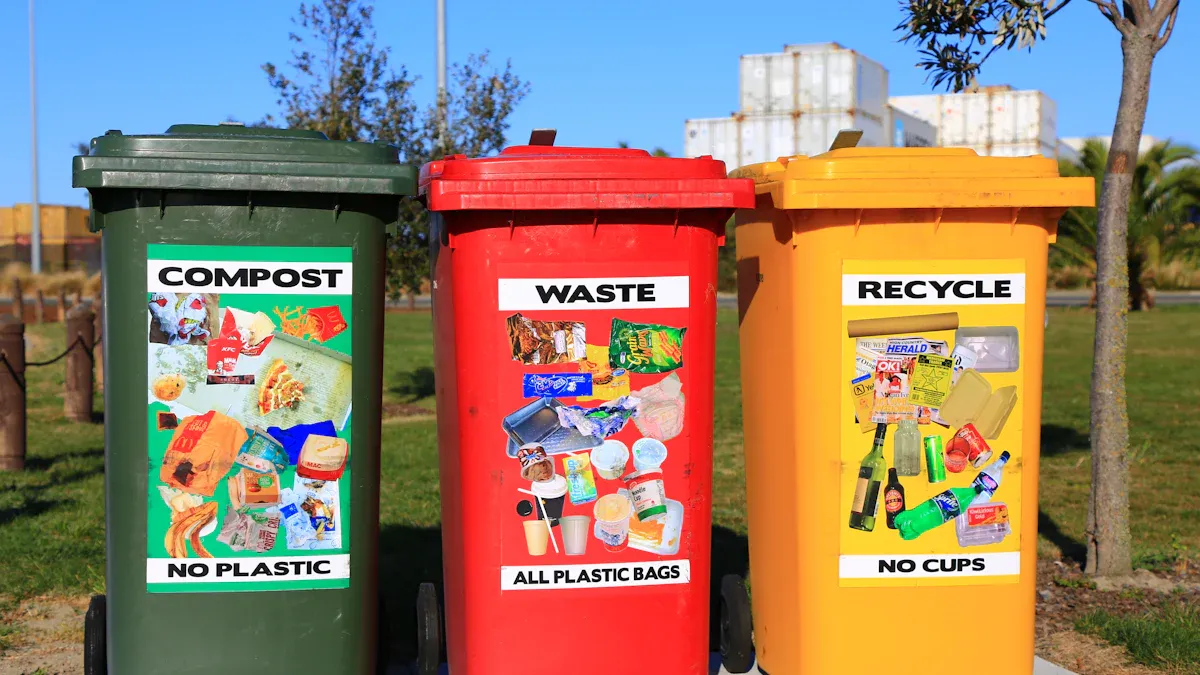
Plastic recycling machines help reduce the harm caused by plastic waste. Over 9200 million metric tons of plastic have been made worldwide. Out of this, 6900 million metric tons have not been recycled. This leftover plastic damages nature and causes pollution. Using these machines keeps plastic out of landfills and water. This lowers pollution and helps protect the environment. Recycling 1 ton of plastic saves about 130 million kilojoules of energy. It is a smart way to save energy. These machines also save resources by reusing plastic instead of using new materials. Using them is important for protecting the planet and keeping it clean.
Plastic recycling machines cut pollution by keeping plastic away from landfills and oceans.
Recycling one ton of plastic saves lots of energy, about 130 million kilojoules.
Using recycled plastic saves resources and reduces the need for new materials. This helps protect nature.
Recycling lowers harmful gases by reusing old plastic instead of using fossil fuels. This helps keep the planet cleaner.
Small actions, like sorting trash or buying recycled items, support sustainability and help make a greener future.

Plastic recycling machines help keep plastic out of landfills. Plastic in landfills takes hundreds of years to break down. While breaking down, harmful chemicals like lead can leak into soil. These chemicals can harm plants, animals, and even people. Recycling machines stop waste from polluting the environment.
Recycling also helps companies handle waste better. With sorting systems, more plastic gets reused instead of wasted. This reduces the need for new materials and cuts pollution. Recycling plastic also saves energy. For example, one ton of recycled plastic saves 130 million kilojoules. This helps the planet and saves resources.
Recycling machines also stop plastic from reaching oceans and rivers. Millions of tons of plastic enter oceans every year. This plastic harms sea animals like turtles, fish, and birds. They often eat plastic, which can hurt or kill them. Recycling stops plastic from being dumped into water.
Recycling keeps waterways cleaner and reduces pollution. It also encourages reusing materials to protect the planet. When you recycle, you help marine life and the environment. Recycling machines make this process faster and more effective. This means less plastic ends up in the ocean.
Plastic recycling machines help us use fewer new materials. These materials include things like oil and natural gas. Recycling plastic saves these resources for other uses. Making new plastic needs fossil fuels, which harm the planet. Using recycled plastic instead can save up to 70% energy. This also means using less fossil fuel and cutting pollution. Recycling is a smarter and greener choice.
Recycling plastic also helps us use resources more wisely. Right now, only about 20% of common plastics are recycled. With better systems, this number could double. Over 70% of plastics in bins can be sorted and reused. Recycling saves resources and lowers the damage caused by making new plastic.
|
Evidence Type |
Statistic |
What It Means |
|---|---|---|
|
Energy Savings |
Up to 70% |
Using recycled plastic saves energy and cuts pollution. |
|
Recycling Rate |
20% |
Only 20% of common plastics are recycled, but this can improve. |
|
Effective Recycling |
70% |
Over 70% of plastics in bins are sorted and reused properly. |
Recycling plastic uses much less energy than making new plastic. By recycling, we lower the energy needed for production. For example, recycling one ton of plastic saves 130 million kilojoules of energy. This means burning fewer fossil fuels and creating less pollution. It’s better for the Earth.
New recycling methods, like breaking down PET with enzymes, save even more energy. These methods cut energy use by 69%–83% and lower pollution by 43% per kilogram of material. Recycling plastic also creates jobs at recycling centers. Choosing recycled plastic helps save resources and supports eco-friendly habits.
Recycling plastic is not just good for nature; it also saves energy and helps the planet.
Recycling plastic helps cut greenhouse gas emissions. Making new plastic needs fossil fuels, which release carbon dioxide. Recycling uses old plastic, so fewer emissions are created. This process reduces the need for making new plastic.
Using recycling machines can lower carbon emissions by 30% to 80%. Recycling uses less energy and fewer resources than making new plastic. Choosing recycled plastic helps fight climate change and keeps the planet cleaner.
Burning plastic waste releases harmful gases like carbon dioxide and methane. These gases trap heat and make global warming worse. Recycling is a better choice than burning plastic. Machines turn old plastic into reusable materials, stopping harmful gas release.
Recycling also keeps plastic out of landfills. In landfills, plastic breaks down and releases methane, a strong greenhouse gas. By recycling, you help reduce pollution and protect the Earth. Recycling instead of burning plastic is an easy way to help the environment.
Recycling plastic helps lower emissions and creates a greener future.

Recycling plastic helps protect nature and animal homes. When we recycle, we use less oil and gas. These materials are taken from forests and wetlands. Taking them destroys places where animals live. Recycling saves these areas and helps plants and animals survive.
Recycling also means less mining and drilling. These actions harm the land and pollute water. By recycling, we help keep nature safe and balanced. Every recycled item helps protect the Earth’s resources.
Plastic waste is dangerous for animals. They may eat it by mistake. This can make them sick or even kill them. Recycling lowers the amount of plastic in nature. This keeps forests, rivers, and oceans safer for animals.
Recycling also stops harmful chemicals from getting into soil and water. These chemicals can hurt animals and their homes. Using recycling machines helps keep animals safe. Cleaner places mean healthier homes for all living things.
Recycling isn’t just about trash. It helps make the world safer for people and animals.
Recycling helps turn old plastic into new items. This reduces trash and keeps materials useful. Instead of throwing plastic away, recycling machines reuse it. This saves resources and lowers harm to the environment.
New recycling ideas show how reusing plastic helps. For example, AMP Robotics improved how polypropylene is recycled. Their work shows recycling can save money and work better.
|
Initiative |
Key Outcomes |
|---|---|
|
AMP Robotics: Polypropylene Recovery |
Better recycling rates and money saved through smarter methods. |
Recycling supports a circular economy. This system reduces waste and keeps materials in use. It also means fewer raw materials are taken from nature. Recycling protects ecosystems and helps keep the planet clean.
Recycling helps people make eco-friendly choices every day. Buying recycled products supports companies that care about the planet. This lowers the need for making new plastic and saves energy. Responsible choices mean buying less and picking greener options.
Businesses also benefit from recycling by saving money and cutting waste. Companies that recycle often become more efficient and gain a better reputation. Recycling inspires new ideas for reusing materials and reducing trash.
When you recycle, you help protect the Earth. Simple actions, like sorting trash or using recycled goods, make a big difference. These efforts build a cleaner future and support a circular economy for everyone.
Plastic recycling machines are important for a sustainable future. They cut down plastic waste and save resources. These machines also reduce harmful gases in the air. Recycling helps stop pollution and keeps nature safe. Studies show recycling is better for the environment than other waste methods. These machines reuse materials and create less trash. Using them helps make the planet cleaner and healthier for everyone.